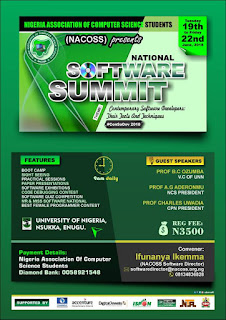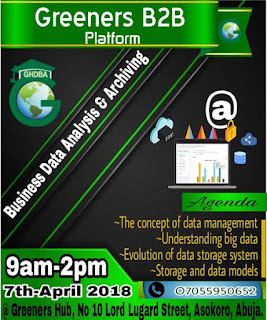As the best student in the Department of Computer Science and overall best graduating student at McPherson University in the 2016/2017 academic session, Faith Ojumah sure has a lot to be thankful for; it was a dream come true. She graduated with 4.84 CGPA to lead her set. In this interview with TUNDE AJAJA, the 19-year-old speaks on the feat and why she would rather be a farmer
You look like someone who likes to be fashionable, is that assumption right?
It’s one of the best memories I have about growing up. As a child, I liked fashion a lot and I remember that when my mum wasn’t around, I would enter her room, wear her wig, sunglasses, shoes, apply lipstick and carry her handbag. If you saw me on the road, you would not believe I was seven years old. Other children used to praise me as well. I had several friends but after the death of my mother, they all left. At that tender age, I learnt about fake friends. In junior secondary school, I neither liked school nor knew what it meant to read in order to pass. The only reason I went to school was because of the provisions my parent would give me. I loved parties a lot because of my love for music and party food. I know those people who knew me when I was a child would be surprised by the woman I have become because I have changed totally. Although, I still have love for music and fashion. During my holidays, I learnt sewing and till date, I enjoy sewing.
The things that interest you seem to be in contrast with the course you studied in school. What other interests do you have?
I enjoy sewing and writing. Currently, I’m working on my first book, which is set to be released in May 2018. And then I love farming the love for farming.
What informed that?
Pear leaves influenced the interest. When I discovered that pear leaves could reduce high blood pressure, it got me thinking that the solution to health problem that had killed many people was right there in my compound. I found that interesting. I will like to be a crop farmer.
How do you plan to go about it?
I like to grow oil palm and avocado and I am currently working on a seven-year plan where the first three years will be used for acquiring knowledge and raising funds. If possible, I will have a laboratory, although; I am more interested in the processing stage. I plan to go for training in business management, data analysis and perform researches on the crops I am interested in growing.
Your dad is a poultry farmer; did that in any way influence your passion for farming?
It influenced my passion for farming greatly. My dad cannot do without having animals around him or having plants in his compound. While my brother developed a love for animals, plants caught my interest.
Some parents prefer their children to work in offices rather than to engage in vocations. How did your dad react when he heard about your interest?
My decision to become a farmer does not mean I plan to go to my backyard with a hoe and a cutlass. Rather, I am more concerned with what I can do to change the old system of farming in a way that food and unemployment will no longer be a problem in Nigeria as it is in most developed countries. So, my family fully supports me. Right now, agriculture holds the biggest opportunity that will transform Nigeria and take it out of poverty, starvation and unemployment. That is why I’m really interested in the sector.
With your love for agriculture, why did you still decide to study Computer Science?
I did not go for an agric-related course because I felt I would be taught the same thing they taught my father 30 years ago. I needed something different; a new way of doing an old thing (agriculture). With computer science cutting across all sectors, it was my best option.
How do you plan to deploy your knowledge of computer into the farming project?
There are various aspects of computer science that can be applied to agriculture, such as data mining. Another area is software development to develop a web system where farmers can network; queuing system in handling my workers, operation research in dealing with maximum profit and minimum cost, and so on. These applications will be deployed at the point of need, and that would be very helpful. Farming is an interest that I would not want to throw away. However, my certificate should give me an immediate placement since the aspect of farming I am interested in involves permanent crops that would take years to plan and execute.
Since it is a sector you believe in, what immediate changes do you advocate?
First, we need to change our orientation as Nigerians because agriculture has moved from hoes and cutlasses to a business discussed in conference rooms. It is big enough to accommodate millions of unemployed youths, not only in Nigeria, but in Africa. We have to package what we have and sell to the world. One of the issues we have is our high level of importation of frozen foods, dairy products, clothes and medicine, all of which frustrate local production. I believe Nigeria has what it takes to be an exporter of these items, but we like to import because it is easier than improving our raw materials. I also think we have a rich collection of research works done by students. We can make something of them. I suggest that soft copies of those reports should be sent to research institutions where their feasibility could be checked and the ones with high feasibility are harnessed while the rest are kept for future purposes. We also need to fund our research institutions and take their results seriously. There is also a need for what I call “boardroom farming” where data generated from farming activities are collected, analysed, and where problems and solutions are identified. It is also where decisions are taken and information is disseminated to farmers. We also need to develop our herbal medicines and present them in modern forms. We cannot be complaining that we are hungry while we have a large expanse of unused land. For example, the land from Lagos to Ibadan is much. Who knows, maybe a tree there holds the cure to cancer. Finally, we have to stop being selfish. For Nigeria to move forward, people need to shelve the idea of frustrating a system that does not favour them, even if it favours the nation. The face of agriculture cannot change in one day but we can start from today.
Looking at the way people look down on farmers, how does that make you feel?
It makes me sad. I believe agriculture should be taken as seriously as oil and gas because of the opportunities it holds for this nation. People need to change their orientation that farming is only about hoes and cutlasses. They should begin to see it as a business that would address poverty and unemployment. Being a first-class graduate, I intend to bring a new approach to agriculture that would even encourage other young people to venture into the sector.
We learnt that you attributed your excellence to a promise you made to your mum before she died. Tell me about that.
My mum was someone that encouraged her children to have goals and work hard to achieve them. When we achieved our goals; no matter how negligible, she would always be proud of us. After losing her, I made up my mind to sustain all that she trained us to do because I knew that if she were alive every time I achieved a goal, she would have been proud of me. That instilled in me greater strength to keep pushing against all odds.
Was that what propelled you to aim to be the best in your set?
It was part of it, although that zeal started from my father. Few weeks before I entered the university, he brought a newspaper containing the interview of the overall best student of Caleb University at that time and gave it to me to read. That was the starting point for me. At first, I thought it would be easy but it was not. However, after my first result, I knew it was too late to look back. From the first year to the third year, I was satisfied with graduating with a first-class honours degree, but in my fourth year, the people around me encouraged me to aim higher. That initiated my quest to be the overall best. I was already the second best, so all I had to do was to work twice as hard.
What were the things you did differently to make it happen?
I did everything differently to the extent that people felt there was something weird about me. It is said that if you want to be the best, then you must do something different from the rest. I prayed more, read more, made the library my second hostel and disciplined myself in watching movies and playing computer games. Whenever I was too tired to stay awake, I would listen to motivational songs or talks. While others were sleeping, I was awake, browsing to know more because my notes were never adequate enough. I went the extra mile in doing my assignments and taking my tests and exams. I gave every course 100 per cent attention. Finally, I had mentors.
Since you said it wasn’t easy to make a first-class honours degree, were there times you almost gave up on it?
Several times; there were times it got so stressful that I felt it would affect my health if I continued. There were other times I wanted to stop that pursuit to live the average life, but I could not do so because I had a goal to attain.
On hearing about your mum’s death, did it affect your academic performance in any way?
It was shocking, but what was more shocking was the way people changed after her death. Her death had an impact on my academics work, but not in a negative way. It made me to reflect on my life and work harder to make a name for myself and family. Fortunately, I had a strong support from my father, Pastor Victor Ojumah, who believed in me so much.
You faced some challenges with your finances. How bad was it?
It was not so bad until I got to my third year, but it got worse in my fourth year because my younger siblings were both in Senior Secondary School 3, so the bills piled up. But my dad was never the type of person to compromise with anything that had to do with education. He did his best. It was tough towards the end, but we thank God. God saw me through and I was surrounded by people like Revd. Ezekiel Abikoye, his family and other family friends, who sincerely assisted my family. In my second year, my brother called me his role model, then I realised that if I failed, it would not only affect me but people who also looked up to me. All these kept me going and I have not stopped aiming high because the vision does not stop in the university.
How would you have felt if you had not made a first-class honours degree?
I would have felt bad because I worked really hard. However, it would not have changed my goal in life.
What were your most memorable moments in school?
My most memorable moment was collecting a medal at Afe Babalola University during the Nigeria Private University Games Association event in 2016, while the bad moment (I had) was when I had my lowest Grade Point Average of 4.6 in the first semester of my third year.
What are your aspirations?
I want to be the highest employer of labour in the world.
What were the awards and scholarships you received as an undergraduate?
I applied for a scholarship through Scholarstica scholarships and bursaries but I was not given. However, I received five awards of excellence, including the Vice-Chancellor’s Prize for the Overall Best Graduating Student, Dean’s Prize, HOD’s Prize, Hakeem Ogunniran’s Prize and Foursquare Church’s award.






